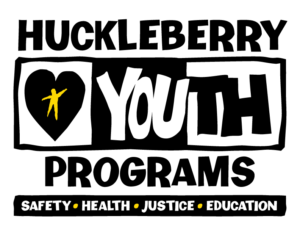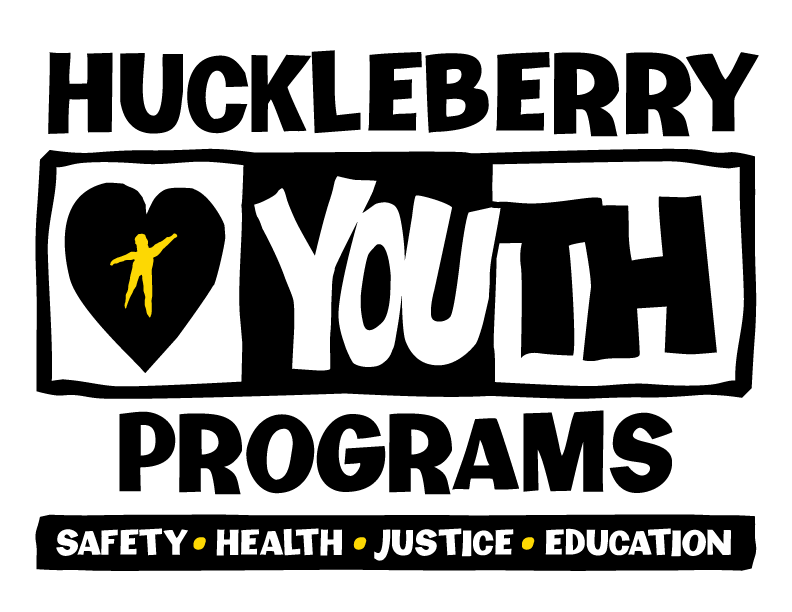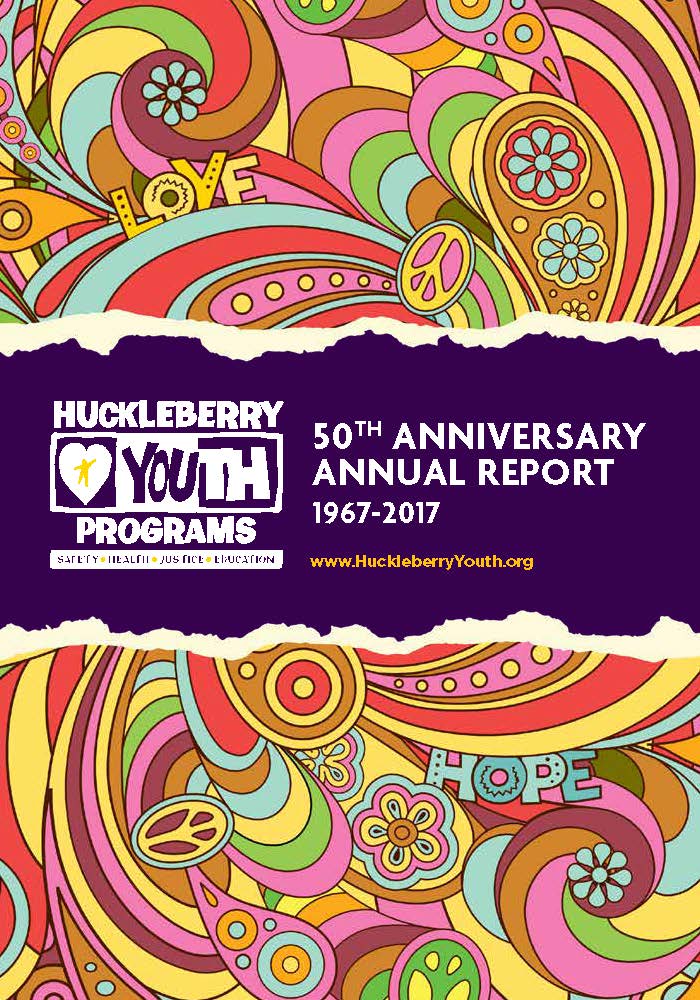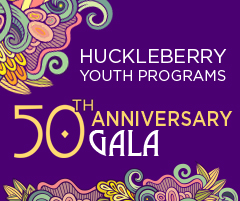We celebrated our 50th Anniversary in 2017!
Our History
Our tradition of caring for Bay Area youth spans over four decades. The robust programs and services Huckleberry Youth Programs provides today can be traced back to what is famously called the Summer of Love. In 1967, the Haight-Ashbury District of San Francisco was the beating heart of the late ’60s counterculture movement, and young people from across the nation were converging on the city to participate in the jubilant moment of change and newfound freedom. Many of those arriving in the city were runaway teens who had left their homes and families in other cities and states and then wandered the Haight without money, friends, or connections. It was then that our story began…
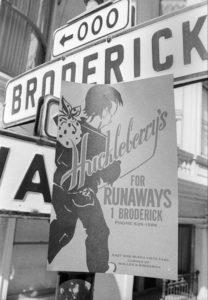
A “Huckleberry’s For Runaways” poster circa 1967
June 18, 1967 – Huckleberry House Opens.
With the support of the Glide Foundation and the San Francisco Foundation, the Huckleberry’s for Runaways project officially opens its first residential facility in a house owned by the San Francisco Foundation at 1 Broderick Street. Staff and volunteers have readied the site for clients in only 3 days. The House will provide an alternative to incarceration in San Francisco’s Youth Guidance Center for runaway youth. During its first three months of operation, Huckleberry’s for Runaways serves a total of 211 youth in crisis, far exceeding original expectations. By the end of the first full year of operation, the total will reach 664.
October 2, 1967: Police stage a midnight raid at Huckleberry’s for Runaways. Staff members are charged with contributing to the delinquency of a minor.
Police stage a midnight raid at Huckleberry’s for Runaways. Co-director Barbara Brachman and House Manager Burgie Oberhammer are arrested, as are all of the youth sleeping in Huckleberry’s facility that evening. Co-director Larry Beggs is arrested the following day. The arrests stem from an administrative oversight which has, for the first time in 168 cases, allowed a 15-year old boy to stay overnight in the House without parental consent. The House’s clients are all charged with 601s – being without parental supervision. Staff members are charged with contributing to the delinquency of a minor, a misdemeanor. The Glide Foundation secures the services of State Assemblyman Willie Brown to defend the House staff members and its young clients.
October-December, 1967 The community rallies in support of the House staff members.
December 13, 1967 Legal charges against Huckleberry’s residents and staff are dropped, but licensure continues to be a difficult issue. The new facility does not fit the State’s child-care facilities category, which was created for institutions such as boarding schools where youth stay for long periods of time. Assemblyman Willie Brown promises to introduce legislation to permit the operation of emergency youth facilities in the State for short-term stays by minors in crisis. Meanwhile, start-up funds for Huckleberry’s are beginning to dry up, and the agency’s Co-Director, Barbara Brachman, resigns at the end of the year.

Huckleberry House Founder Larry Beggs
January 1, 1968 Huckleberry’s for Runaways closes for a six-week period to conduct its first major fundraising drive to keep the House open and negotiate licensure requirements. The turning point comes when an anonymous Canadian donor pledges $8,500 to keep the House open.
February 14, 1968 On Valentine’s Day, Huckleberry’s for Runaways officially reopens at 1 Broderick Street. Over 600 people attend the reopening celebration and street party held on February 11th of that year.
1969 – Incorporated as Youth Advocates, Inc., Huckleberry House is established in the Haight on Frederick Street.
1973 – Youth Advocates launched Alternative Family Services, which then separated from Youth Advocates in 1978.
1974 – Nine Grove Lane opens in San Anselmo, Marin County. Created in 1974, Nine Grove Lane was a model based on Huckleberry House’s success in San Francisco and emerged in response to the need for services for runaway and other at-risk youth in Marin County. One of the program’s memorable activities in the mid-1970s was the utilization of a 26-foot mobile outreach van, C.C. Rider, that traveled throughout Marin County providing on-the-spot counseling and crisis services. In 1991, Nine Grove Lane was also designated by the county to be the primary shelter for abused teenagers.
1983 – Huckleberry Youth Programs (then Youth Advocates) created a consortium of nonprofits (Central City Hospitality House, Catholic Charities CYO, and URSA Institute) with federal funding to explore services for homeless youth in the Polk/Larkin area of San Francisco. Funding out of that group established what is now known as Larkin Street Youth Services.
1988 – Bruce Fisher becomes Executive Director.
A former partner in Urban and Rural Systems Associates, Fisher brings immense experience in social policy, particularly in the area of child and adolescent abuse, juvenile prostitution, family violence, and juvenile justice and corrections.
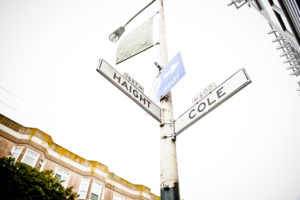 1989-92 Youth Advocates creates a program to address HIV prevention among runaway and homeless youth. The program leads to the creation of the Cole Street Youth Clinic at Cole and Haight Streets in San Francisco.
1989-92 Youth Advocates creates a program to address HIV prevention among runaway and homeless youth. The program leads to the creation of the Cole Street Youth Clinic at Cole and Haight Streets in San Francisco.
Youth Advocates wins the first contract ever given by the U.S. Centers for Disease Control to address HIV prevention with runaway and homeless youth.
Over the next few years, Youth Advocates receives additional grants from foundations including the Robert Wood Johnson Foundation, San Francisco Foundation, and California Wellness Foundation. The funding creates the Cole Street Youth Clinic, which soon becomes the largest community-based adolescent health clinic in SF, serving 1,500 clients annually. Youth Advocates Teen Peer Health Educators are invited to Chicago to testify before the National AIDS Commission. Youth Advocates’ first HIV Program Director, Danny Keenan, is featured on a number of local and national TV shows. In 1992, Danny passes away from AIDS. Huckleberry Youth Programs names an annual staff award in his honor.
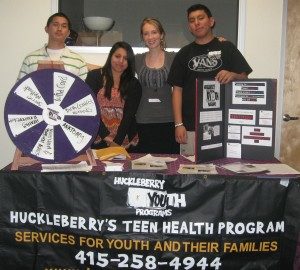 1998 – Youth Advocates, Inc. legally changes its name to Huckleberry Youth Programs (HYP)
1998 – Youth Advocates, Inc. legally changes its name to Huckleberry Youth Programs (HYP)
1996 – Huckleberry’s Teen Health Program opens in San Rafael’s Montecito Plaza
Dr. Tom Peters, then Director of Marin’s Department of Health and Human Services, holds a series of county-wide roundtables on the “epidemic” of STD’s in teens in Marin. After a visit to YA’s Cole Street Clinic in SF, he asks YA to partner with Marin’s DPH in creating a teen clinic for Marin. Youth Advocates leases space in Montecito Plaza, San Rafael and opens the Huckleberry Teen Health Program. Six months later the Teen Tuesday Clinic opens and quickly becomes the largest adolescent health clinic in Marin (600+ clients annually).
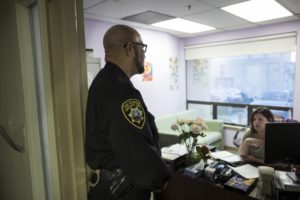
Deputy Sheriff Ken Harrison and Huckleberry Community Assessment & Resource Center Director Stacy Sciortino.
2000 – Huckleberry becomes the lead agency in San Francisco’s Community Assessment and Resource Center (CARC).
CARC is part of a city-wide initiative planned by Mayor Willie Brown, funded by state grants and initially led by Mimi Silbert and the Delancey Street Foundation to create new community alternatives to the detention and incarceration of juvenile delinquents. HYP was a sub-contractor to Delancey Street in year one of the CARC (7/1/99-6/30/00) and is asked by the City and Delancey Street to assume leadership of the program beginning in its second year. On average, Huckleberry CARC sees 250 non-violent offenders annually, all of whom are police-delivered. HYP and partner-CBO case managers conduct an individual assessment and provide intensive case management for all clients. CARC has become a national model in juvenile justice.
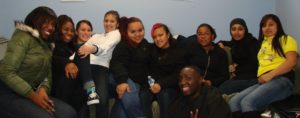
The first cohort of the Huckleberry Wellness Academy-SF
2006-2008 – The Huckleberry Wellness Academy is created through a strategic planning process.
The Huckleberry Wellness Academy is a college pipeline program that recruits, trains, and encourages young people to enter the health professions. The program is so successful in San Francisco that in 2008, the Huckleberry Wellness Academy-Marin opens.
In 2008, because of diminished utilization, Marin county and Huckleberry agreed to close down Nine Grove Lane shelter in San Anselmo.
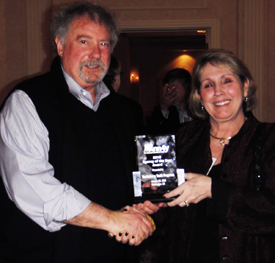
Bruce Fisher accepting Huckleberry’s Agency of the Year Award from the National Network for Youth
2010 – Huckleberry Youth Programs is named the 2010 Youth Agency of the Year by the National Network for Youth in Washington, D.C.
The National Network for Youth (NN4Y), an organization composed of community-based youth organizations across the country, honors Huckleberry with this award in January 2010. According to Victoria Wagner, CEO and President of NN4Y (pictured with Huckleberry E.D. Bruce Fisher), “Huckleberry is eminently qualified for selection as the Agency of the Year because of the organization’s wide scope of youth programming, years of innovation in the field of youth services, and commitment to collaboration with other youth-serving organizations.”
The Huckleberry Community Assessment and Resource Center (CARC) moves into a new expanded facility at 44 Gough Street. Five days later, Mayor Gavin Newsom holds a press conference at CARC announcing the creation of a truancy prevention program at 44 Gough (Truancy Assessment and Referral Center -TARC), in partnership with Huckleberry CARC.
The Department of Public Health (DPH) funds the creation of the Huckleberry Youth Multi-Service Center – San Francisco. The Huckleberry Youth Multi-Service Center targets transitional age youth and is collaboration among Huckleberry Youth Programs, Larkin Street Youth Services, and DPH’s Community Health Programs for Youth. In June, the second graduating class of the Huckleberry Wellness Academy – San Francisco (HWA) sends 11 new graduates off to college, joining the 14 graduates from our 2009 inaugural class.
The Huckleberry Wellness Academy expands into Marin County, with two new cohorts of 17 high school juniors in San Francisco, and 25 high school freshmen in Marin.
In September, Huckleberry celebrates the grand opening of the Marin Multi-Service Center at Montecito Plaza, a new 6,000 sq. ft. space that houses health education services, Teen Tuesday Clinic, a state-of-the-art classroom for our Huckleberry Wellness Academy, and expanded therapy offices.
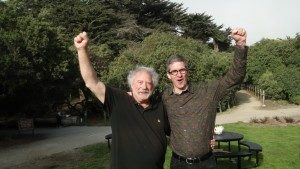
Bruce Fisher retires in 2014 and Douglas Styles becomes Huckleberry’s new Executive Director
2013 – 2015. Bruce Fisher announces he will retire after 26 years as Huckleberry’s Executive Director. Douglas Styles is hired and begins on July 1, 2014 Huckleberry is one of two San Francisco organizations to win a highly competitive $50,000 regional Northern California Kaiser Permanente grant to expand services for youth exposed to trauma.
Huckleberry also wins a $50,000 grant from Kaiser San Francisco Community Benefits Program, the only grant awarded under their Access to Health Care focus. The proposed project will increase clinic access amongst high-risk youth, including low-income youth of color living/going to school near Huckleberry Youth Health Center in the Haight-Ashbury. San Francisco’s District Attorney, George Gascon, awards a Restorative Justice grant to Huckleberry’s Community Assessment& Resource Center (CARC).
Huckleberry and partner agency Community Works, pilot a Restorative Community Conferencing (RCC) project for youth arrested for serious offenses. RCC sessions are based on the theory of Restorative Justice, which emphasizes repairing harm caused by criminal behavior and considers crime and wrongdoing to be an offense against an individual or the community, rather than the state.
The Huckleberry Youth Multi-Service Center in San Rafael’s Montecito Plaza expands substance abuse treatment services with a new three-year grant from the Marin County Office of Mental Health and Substance Abuse Services. The Multi-Service Center becomes State certified as a general outpatient adolescent substance abuse facility and two full-time Drug and Alcohol Counselors provide brief intervention and substance abuse treatment. Services include individual, family, and group counseling, and case management.
Huckleberry was chosen as one of 15 organizations to receive a California PropelNext grant. This is a three-year planning grant from the William and Flora Hewlett Foundation, along with an equal investment of one-on-one expert coaching, group learning sessions, and a peer learning community, underwritten by the Edna McConnell Clark Foundation. The grant will help Huckleberry deepen interventions with and impact on youth we serve at the Huckleberry Community Assessment & Resource Center.
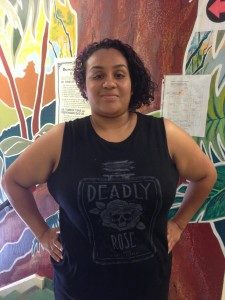
Kailey Norris is hired as Huckleberry’s Intervention Specialist to work with victims of human trafficking
Commercially Sexually Exploited Children (CSEC): The San Francisco Human Services Agency (HSA) selected Huckleberry to pilot a program providing immediate crisis intervention and case management services for commercially sexually exploited children and young adults (CSEC/YA). Huckleberry staff will provide 24 hour/7 day/week response in emergency calls from a Child Protection Hotline and next business day response in non-emergency situations. This work builds on the case management and advocacy work that Kailey Norris (at left), the Huckleberry CSEC Intervention Specialist, began in 2014 and will result in staff going into the field to meet with social workers and other parties including police, probation, etc.
The Bruce Fisher Education Fund is created to assist students in the Huckleberry Wellness Academies with unfunded college expenses such as books, transportation, housing deposits, meal plans, and tuition gaps. Generous donors helped raise $60,000 for that fund.
Substance Abuse Services at Redwood High: As one of the only licensed adolescent substance treatment centers in Marin County, Huckleberry begins working side-by-side with Redwood High to offer both group and individual substance abuse counseling.
Child Abuse Treatment (CHAT) Program: The California Office of Emergency Services awarded Huckleberry a five-year contract to enhance our existing services for child victims of crime and child abuse. The new contract increased Huckleberry’s counseling program to serve approximately 100 additional youth annually, prioritizing under served youth who are involved in the child welfare system.
Huckleberry’s 7th Annual Run for the Roses wine tasting and auction event was held at the Clubhouse at Peacock Gap on Saturday, May 2, 2015. It raised a record $215,000 for youth and families.
2016 – Huckleberry Advocacy & Response Team (HA&RT) – In collaboration with Children’s Protective Services, the Police Department, the District Attorney, and the Probation Department, Huckleberry began immediate, 24-hour, crisis intervention and case management services for trafficked youth through HA&RT. This work involves one-on-one support for youth ages 11-24. Youth are referred to HA&RT from within Huckleberry programs, the foster care system, probation, schools, and other community partners.
Project READY– Learning from our juvenile justice programming, Huckleberry piloted a new prevention program in 2016 called Project READY, which provides case management, counseling, and socio-emotional learning services to eighth graders in need of additional support.
As part of the “Getting to Zero Consortium,” a major San Francisco HIV prevention initiative, the Huckleberry Youth Health Center has begun to offer PrEP and has revised our HIV education (HYPE) curriculum to inform youth about PrEP.
Huckleberry’s substance use counseling and treatment services were embedded in eight Marin County schools, including Marin County’s first school-based Wellness Center in 2016.
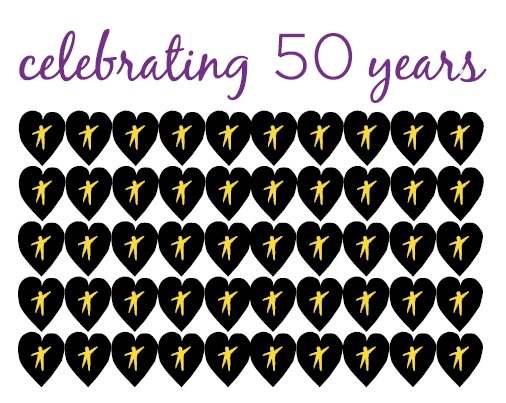
2017 – 50TH ANNIVERSARY YEAR!
Counseling and Case Management Expansion – Huckleberry received its fourth consecutive grant from Kaiser Permanente to grow our Youth and Trauma Informed Care initiative. We began expanding our case management and counseling services into under served San Francisco middle schools.
Working with Newcomer Youth – To meet the needs of the increasing number of unaccompanied, newcomer youth arriving in the U.S., Huckleberry is collaborating with public schools to provide specialized psycho-social groups and support for these youth.
Huckleberry was one of five non-profit organizations honored by the San Francisco Giants with the 2017 Community All Stars Award.
Huckleberry is a member of the Coordinated Community Response Council for Intimate Partner Violence (IPV), a Council developed to implement a coordinated system to expand screening, intervention, and data tracking for IPV Marin County-wide.
Through a large, multi-year state grant, Huckleberry has increased our counseling team’s capacity and nearly doubled the number of youth receiving therapy.
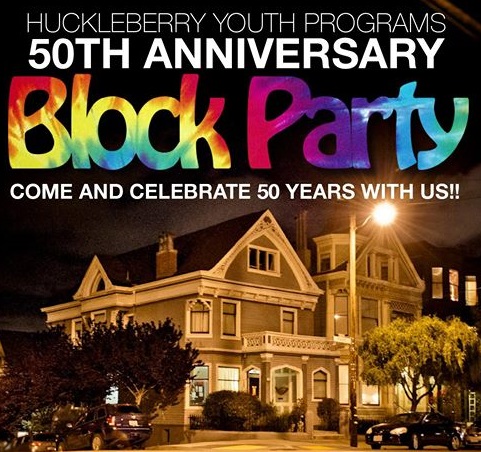
On Sunday, June 18, 2017, Huckleberry hosted a 50th Anniversary Block Party to celebrate Huckleberry House’s opening as the first shelter for runaway and homeless youth in the United States.
In coordination with Tamalpais Union High School District, we are increasing our substance abuse and counseling services within Marin high schools to reduce barriers for services.
Huckleberry Wellness Academy-Marin provided college application workshops to program participants as well as students who might otherwise not receive college access support, reaching an additional 187 high school seniors last year.
TedED collaborated with Huckleberry Wellness Academy-San Francisco, providing sophomores with a unique opportunity to record a Ted-style talk on a subject important to them, and two students traveled to New York to participate in the international TedEd conference.
On November 30, 2017, Huckleberry hosted a 50th Anniversary Gala. Our supporters helped us raise $450,000 for our programs! Willie Brown was honored with the Bruce Fisher Community Partner Award and Union Bank was honored with the Corporate Partnership Award.
